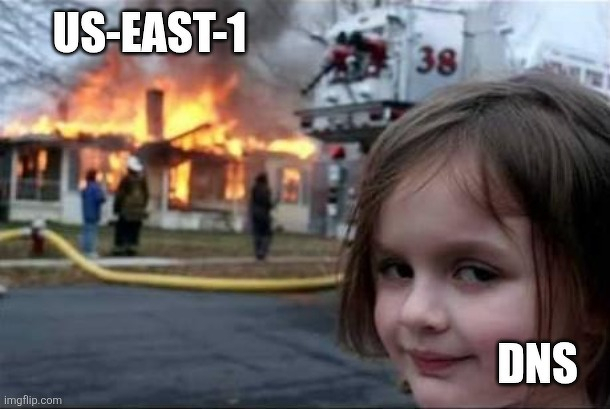us-east-1, Eight Sleep, and the Internet of Things
A couple of weeks ago on October 20, 2025 Amazon Web Services (AWS) had a catastrophic failure as their us-east-1 region (North Virginia) went down. Amazon does not publish info on how many data centers each region has, but the public guesses linger around one hundred for this particular one. This failure also brought down or severely degraded the performance of many high profile services such as Slack, Zoom, Lyft and Hulu, and the event made it to the mainstream news around the world.
To me, however, the most striking service that suffered from this was one that I hadn’t even heard of before. It was a company called Eight Sleep, which makes smart beds to optimize your sleep quality. The beds have sensors and will adjust the temperature of the mattress for comfortable sleeping. On the night the us-east-1 went down many Eight Sleep users apparently woke up because their bed was too warm: the beds couldn’t handle being offline as their background servers were unavailable! Adding insult to injury the beds even had no local override: when offline, you could not adjust their temperature or inclination, so that users also had their beds stuck in wonky positions.
Additionally, disgruntled users began looking into the web traffic patterns of their mattresses, finding out their beds upload between 16 to 24 gigabytes of data into the cloud every month. To put this figure in perspective, it’s like having an always-on telephone call consuming your bandwidth. Coincidentally, that’s also about equal (or more!) to the amount of telemetry that an actual Apollo mission spaceship used to send (source: Wikipedia). Furthermore, the beds aren’t doing anything that the Apollo Guidance Computer couldn’t have easily calculated some sixty years ago already.
The audacity of this service is something else. These things always bring me to one of my favorite movie quotes, from Jurassic Park (1993):
Your scientists were so preoccupied with whether or not they could that they didn’t stop to think if they should.
Just because it’s possible to connect your mattress or your refrigerator to the internet doesn’t mean you should do that. I in fact recently bought a new fridge, and while it does seem to have some wifi indicator I have no intention whatsoever to ever connect it to any network. There’s just no use case for it.
Similarly, when I bought a new watch its sister model would’ve had Bluetooth. However, it being a non-smart watch, I found no use case for it. It might be worth for you if you constantly travel over timezones and need to adjust your watch, but I can do that manually a couple of times in a year just fine.
I’m not some luddite against technology and I in fact really like my Philips Hue lights around the house, but they actually have use cases, and they even work when the internet is down. Also not insignificantly I’m reminded of the truth by the world famous cybersecurity professional Mikko Hyppönen:
No need to widen the attack vector for malicious actors for nothing. For example, if your freezer is hacked, your food may rot and you may need to replace your floor when the ice in the appliance melts.
